Brown Collection 79. The Wife of Usher's Well
25. The Wife of Usher's Well (Child 79)
This admirable ballad has lasted better in America, for some reason, and especially in the South, than in the land of its birth. See BSM 55-6, and add to the references there given Florida (SFLQ VIII 152-3), Missouri (OFS I 122-4), Ohio (BSO 46-7), Indiana (BSI 97), and Michigan (BSSM 146). All American texts belong to one version, with a strong religious coloring. The North Carolina collection has nine texts, but not all need be given here.
A. 'The Three Little Babes.' From the collection of Miss Isabel Rawn (later Mrs. T. L. Perry), communicated to the North Carolina Folklore Society in 1915. The verse is rough. Miss Rawn did not indicate the source of the text. Who speaks in the first two lines of stanza 5 and in stanza 7 is not clear.
1. There once was a lady, and she lived in Spain,
And children she had three.
She sent them away to [a] far-off country
Oh, there for to learn their grammere. [1]
2. They hadn't been gone but a very short time.
No more than a month or a day.
Till death, cold death come a-sweeping along
And swept those babes away.
3. As soon as the news reached the mother's ears
She clasp[ed] her hands and cried:
'Oh, if there be a King in Heaven above,
Please send them to me this night!'
4. The night wore on; near midnight come,
And Christ was drawing near.
Those three little babes come running home
Right into their mother's room.
5. 'O mother, go and fix them a table
And on it bread and wine.'
'Come, eat and drink, you three little babes,
Come eat and drink of mine.'
6. 'Take it off, take it off, take it off, mama!
Take it off we pray;
For we see our Savior a-standing so near.
And to him we must resign.
7. 'Oh, mother, go and make a bed
And on it spread a clean sheet,
And over the top spread a golden cloth
For the three little babes to rest upon.'
8. 'Take it off, take it off, take it off, mama!
Take it off, we pray;
For we see our Savior a-standing so near.
And to him we must resign.
9. As the proud mother, with trembling hand,
The winding of sheets renfolding,[2]
The three little babes in snow-white robes
All by her side is garbeded.
10. 'Goodby, mamma! Goodby, papa!
Fare you well, we say.
For the gates of heaven are opening wide
And we must enter in.'
B. 'The Lady and the Children Three.' One of two texts contributed by D. W. Fletcher of Durham in 1914. Observe that the entire experience, after the death of the three children, is represented as a dream, and that the child that speaks is a girl.
1 Once there was a lady and a lady was she,
She had some children — three.
She sent them away to an orphan school
To learn the grammar rule.
2 They hadn't been gone but a very short while,
Some about three months and a day,
'Fore death, sweet death came hasting along
And takend her babes away.
3 The Christmas times were drawing near,
The nights grew long and cold.
She dreamed she saw her three little babes
Come haste to their mother's fold.
4 She fixed them a table of cake and wine,
As neat as neat could be.
'Come, eat, drink, my little babes
Come, eat and drink with me.'
5 'Neither can I eat your cake,' said she,
'Neither can I drink your wine;
For yonder stands my Savior dear.
To him I must resign.'
6 She fixed them a bed by the back side-room
And on it spread a sheet.
And on the sheet was a golden spread
For these little babes to sleep.
7 'Take it up, take it up,' said the oldest one,
'Take it tip, take it up,' said she,
'For every tear they shed for me
Will wet my winding sheet.
8 'Green grass, green grass grows o'er my grave.
Cold pillars on my feet.
What shall become of this wide wicked world
Since when our sins began ?'
C. 'The Three Little Babes.' Fletcher's second text is somewhat longer, lacks the intrusive orphan school, does not indicate the sex of the child that speaks, and presents the whole experience as a fact, not a dream. And it retains the idea that the tears of mourners incommode the dead in their graves. Dr. Brown notes on the manuscript that it can be sung to the tune of 'Barbara Allan.'
1 There was a lady, a lady gay,
And children she had three.
She sent them away to the North Countree
To learn their grammarie.
2 They hadn't been gone but a very short time,
Scarce three weeks and a day,
When there came a sickness o'er the land
And swept those babes away.
3 When their mother dear came this to hear
She grieved her heart awful sore.
She cried, 'Alas! What shall I do?
Shall I see my babes no more?
4 'There is a king who rules above,
Who wears a heavenly crown.
I pray the Lord will me reward
And send my three babes down.'
5 It was a-comin' near Christmas time,
The nights were long and cold.
When her three babes came running down
To their dear mother's hall.
6 She set a table before them then
Spread o'er with bread and wine.
Saying, 'Come and eat, little babes,
Come eat and drink of mine.'
7 'We cannot eat your bread, mammie.
We cannot drink your wine,
For in the morning by break of day
With our Saviour we must dine.'
8 She spread them a bed in her backmost room.
Spread o'er with clean white sheets,
And over the top a golden one,
That they might soundly sleep.
9 'Take it off, take it off, mammie,
Take it off, we say again.
A woe, a woe to this wicked world
So long since pride began.
10 'Cold clods He at our heads, mammie,
Green grass grows at our feet,
And the tears come running down your cheeks
To wet our winding sheet.'
11 'Rise up, rise up,' says the oldest one,
'The rooster soon will crow.
Oh, yonder stands our Saviour dear
And to him we must go.'
D. 'The Three Little Babes.' Sent in by Thomas Smith of Zionville, Watauga county, in March 1914. Corresponds stanza by stanza and almost word for word with C.
E. 'The Wife of Usher's Well' or 'Lady Gay' or 'Three Little Babes' Apparently known by all three names. Sent in with the tune in 1915 or 1916 by I. G. Greer of Boone, Watauga county. The text is the same as C.
F. 'The Three Pore Little Children.' This Mrs. Sutton got from "Old Man Woodie" at Jonas' Ridge, Burke county, "a sort of preacher-blockader, who will argue his right to make whiskey all night." He was reputed to have been "a famous feudist just after the war, and probably a bushwhacker." Here again the return of the children is only dreamed.
1 There was a lady lived near by,
And babies she had three.
She sent 'em away to a cold, cold land
For to learn their grammaree.
2 They had not been gone but about three months,
I'm shore it was not four,
Until there came a sickness to that cold, cold land
And the babes rose no more.
3 She prayed to Jesus in the heavens up above —
He is wearin' of a golden crown —
That he would send her three babes home
Tonight or in the morning soon.
4 It was about one Christmas time,
When the night was long and cool.
She dreamed she seen her three little babes
Come running to their mother's room.
5 She fixed the table with a fair white cloth
And set on it bread and wine.
'Come set you down, my little babes,
And eat and drink so fine.'
6. 'We cannot eat your bread, our maw.
Nor can we drink your wine.
King Jesus won't let us go back
To live up in heaven so fine.'
7. She fixed a bed in the other room.
On it was a clean white sheet,
And on the top was a fancy quilt
For to make them babies sleep.
8. 'Wake up ! Wake up !' says the oldest one,
'Wake up, for it's near 'bout day ;
And we must leave our mother's house
And to Jesus fly away.
9. 'Green grass grows on our head, my maw.
And green moss at our feet.
The tears you've cried for us three babes
Won't wet our windin' sheet.'
G. 'Moravian Song.' This text Mrs. Sutton found in Yancey county. "The singer was an old woman in the county home who had lost all trace of who she really was. She was known as 'Granny' and sang it in a cracked, quavering old voice. She called it 'Moravian Song.' I don't know why." Mrs. Sutton notes that she has found this ballad also in Henderson and Rutherford counties, but not in Caldwell. It differs from preceding texts chiefly in the closing stanzas, which run:
7 The bed was fixed in the back room ;
She made it long and wide.
She spread her own cloak on the bed
And she sat down beside.
8 And then the red red cock did crow
And up and crowed the grey.
The oldest to the youngest said,
'It's time we were away.'
9 'Lie still, lie still a little while.
Lie still but if we may,
For when our mother finds us gone
She'll go mad in the day.
10. 'Green grass grows at our head, mother.
And green grass grows at our feet.
The tears you shed for your little babes
Won't wet our winding sheet.'
H. 'The Lone Widow.' Contributed by Mildred Peterson of Bladen county, but the manuscript is not dated. This is a reduced version, six stanzas. At the close the children tell their mother:
The tears you have shed, my mother dear,
Would wet our winding sheet.
I. No title. One of the songs collected by Professors W. Amos Abrams and Gratis D. Williams in 1945 from Pat Frye of East Bend, Yadkin county. See headnote to 'Lady Isabel and the Elf-Knight" G. A fragment only.
'Come here, come here, my three little babes.
Come here, come here to me.
Come here, come here, my three little babes,
And eat and drink of mine.'
'How can we come
How can we come to thee,
When yonder stands our Saviour dear
To call us all away?'
'Wake up, wake up,' says the oldest one,
'It's getting almost day.
How can we stay in this dark world
When there's a brighter one for me?'
Footnotes for A:
1. So spelled in the manuscript ; presumably a three-syllable word
rhyming with "three."
2. So the manuscript. One suspects some notion about winding-sheets — but what?
--------------------------
25. The Wife of Usher's Well (Child 79) [Music from Vol. 4]
It was difficult to decide whether or not to include the following tunes, for some of them partially, others very closely, resemble one or more of the other versions. It seemed best, however, to print them as illustrating the fact that one of the main characteristics of folksong is the constant flux of a basic material. The close relationship of the majority of these times to 'Barbara Allen' is quite evident.
A. 'The Three Little Babes.' Sung by Mrs. Ewart Wilson. Recorded at Pensacola in September 1929. The last five measures are almost identical with those of the Lloyd Church, N. Hicks, L G. Greer (2nd), and Anonymous versions.
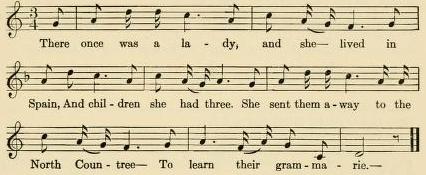
For melodic relationship cf. **FSKM 5; *SharpK i 153, No. 22D. Considering only the basic idea, we find that the Sharp version, measures 4-6, seems to furnish our first phrase a and the former's measures 2-4 our second phrase.
Scale: Mode II, plagal. Tonal Center: d. Structure: aa1ab (2,2,2,2).
C. 'The Three Little Babes.' Sung by Lloyd Church. From the recording of Dr. W. A. Abrams. No place or date given. There is considerable melodic relationship with Mrs. Hicks' version, 25 J.
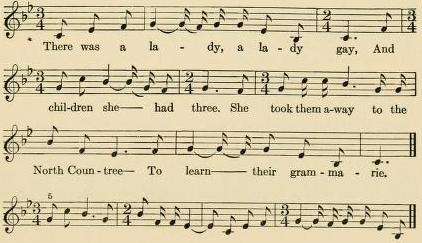

For melodic relationship cf. **SharpK i 152, No. 22B, also beginning of F, J, K, M, and almost all of P ; OPS i 122, No. 19A ; BT 155 ; FSKM 5, measures 5-8; BE 17, version E; BSO 46, No. 14; *FSOA 56 (the version printed there is quite impossible).
Scale: Mode II, plagal. Tonal Center: c. Structure; abb1a1 (2,2,2,2).
C(1) 'The Three Little Babes.' Sung by anonymous female singer ; no place or date. Very closely related to 25 J and 25 E (1).
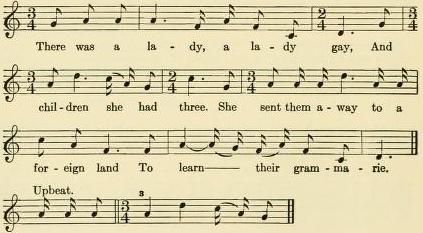
For melodic relationship cf. **SharpK i 151-9. Nos. 22 B, F, G, and P, and most of the basic melodic line also in I, K, M, N. Similarly in BB 17, version E and BT 155; FSF 280; FSKM S; *OFS i 122, No. 19A. Scale: Mode II, plagal. Tonal Center: d. Structure: abb1a1 (2,2,2,2).
D. 'The Three Little Babes.' Sung by Thomas Smith ; no place or date. The basic melodic tendency is closely related to the Greer version (first version, cylinder 6-VII), 25E.
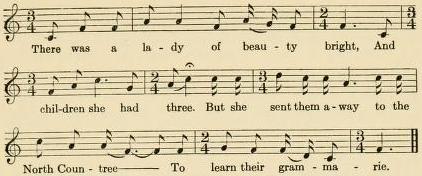
Scale: Mode III, plagal. Tonal Center: f. Structure: abed (2,2,2,2).
E. 'The Wife of Usher's Well.' Recorded as ms score from I. G. Greer of Boone, Watauga county, 1915 or 1916. Basically, this version is related to the Smith version, 25D. For variants of text cf. BB, 50-1.
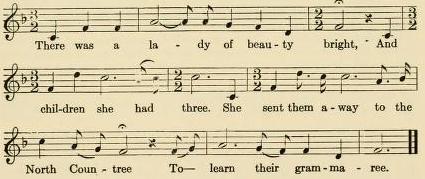
For melodic relationship cf. SharpK I 160, No. 22Q, first and second cadences and measures 6-7. Scale: Hexachordal, plagal. Tonal Center: f. Structure: abb1a1 (2,2,2,2).
E (1) 'Three Little Babes' or 'Lady Gay.' Sung by Dr. L G. Greer. Likewise recorded as MS score at Boone, Watauga county, 1915 or 1916. The singer stated that the same tune goes for this version as for the first. Melodically speaking, there are only negligible deviations in the second recording. The metrical distribution, however, differs in the basic values.
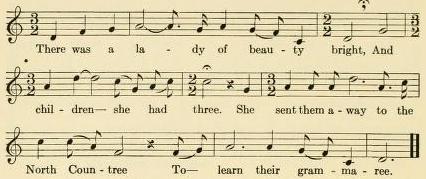
For melodic relationship cf. **SharpK i 151-9, No. 22 B, F, I, K, M, N, and some measures of P. Our first three measures are like those of version G. Others are BT 155, and FSKM 5. Scale: Mode II, plagal. Tonal Center: d. Structure: abb1a1 (2,2,2,2).
J. 'The Three Little Babes.' Sung by Mrs. Nora Hicks. Recorded at Mast's Gap, Watauga county. No date. The singer is the mother of Mrs. Calvin Hicks and the daughter of Aunt Becky Hicks, who lived back of Willowdale Church near Sugar Grove. This song resembles very closely the Lloyd Church version (25C) as well as Greer's second version (25E(i)). The text is the same as for the latter.
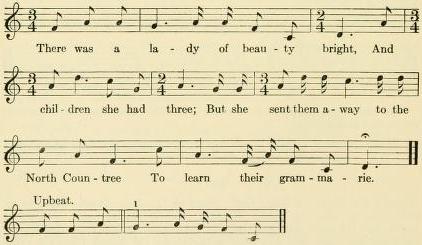
For melodic relationship cf. **SharpK I 151, No. 22B ; OFS i 122, No. 19A; BT 155; FSKM 5; *BSO 46, No. 14. Scale: Mode II, plagal. Tonal Center: d. Structure: abb1a1 (2,2,2,2).
_____________________________
The Wife of Usher's Well, performed by Lloyd Church
The Wife of Usher's Well, performed by Uncle Pat Fry
The Wife of Usher's Well, performed by Dr. Cratis Williams
The Wife of Usher's Well, performed by Nora Hicks
-----------------
Lyric var. 1
The Wife Of Usher's Well
or
Lady Gray, or Three Little Babes
There was a lady of beauty bright,
And children she had three;
She sent them away to the north countree
To learn their grammaree.
They hadn't been gone so very long,
Scarcely three months and a day,
hen there came a sickness all over the land
And swept them all away.
And when she came this for to know,
She wrung her hands full sore,
Saying alas! alas! what shall I do,
For I'll never see my babes any more.
Ain't there a king in Heaven, she said,
Who used to wear a crown?
I pray the lord will me reward
And send my three babes down.
It was a-comin' near Christmas time,
And the nights were long and cold,
When her three little babes come runnin' down
To their dean mother's home.
She set a table for them there,
All covered with cakes and wine,
And said, Come eat, my dear little babes,
Come, eat and drink of mine.
We do not want your cakes, mamee,
We do not want your wine;
For in the morning by break of day,
With our Saviour we must dine.
She fixed them a bed in the backmost room,
All spread o'er with clean white sheets,
And on the top a golden one,
That they might soundly sleep.
Take it off,take it off, mammee, they said,
Take it off we say again.
A woe, a woe to this wicked world,
So long since pride began.
Cold clods lie at our heads, mammee,
Green grass grows ... t our feet;
The tears come running down your cheeks
To wet out winding-sheet.
Rise up, rise up, said the oldest one ,
I hear the rooster crow;
Oh, yonder stands our Saviour dear,
And to him we must go.
The Wife of Usher's Well, sheet 10 music single stanza text -Greer coll. Lyric Variant 02 [greer Recording]
The Wife of Usher's Well
( Or, "Lady Grey': 01 "Three Little Babes".
A ballad of the return of the dead)
There was a lady of beauty rare,
And children she had three;
She sent them away to the North Countree
To learn their Grammarree.
They hadn't been gone so very long,
Scarcely three months and a day,
When there came a sickness all over· the land,
And swept them all away.
And when she came this for to know,
She wrung her hands full sore,
Saying, "Alas, alas! What shall I do,
For I'll never see my babes any more :
• Ain't there a king in Heaven,"she cried,
"Who used to wear a crown?
I pray the Lord will he reward,
And send my three babes down."
It was a-comin' near Christmas time,
And the nights were long and cold,
When her three little babes come running down
To their dear mother's home.
She set a table for them there,
All covered with cakes and wine,
And said, "Come eat, my dear little babes,
Come, eat and drink of mine."
"We do not want your cakes, Mammae,
We do not want your wine;
For in the morning by the break of day,
With our Savior you must diDe."
She fixed them a bed in the back-most ~oom1
All spread o'er with clean white sheets,
And on the top a golden one,
That they might soundly sleep.
"Take it off, take it off, Marmnee, they said,
Take it off we say again.
A woe, a woe to this wicked world,
So long since pride began.
"Cold clods lie at our heads, Mammee,
Green grass grows at our feet,
The tears come running down your cheeks
To wet our winding sheet."
"Rise up, rise up," said the oldest one,
"I hear the rooster crow,
Oh, yonder stands our Savior, dear,
And to him we must go! "
The Wife of Usher's Well- sheet 9; Greer single sheet music no text
The Wife of Usher's Well- sheet 9; music no text; Ballad of the return of the dead